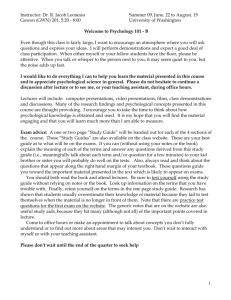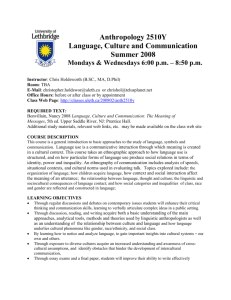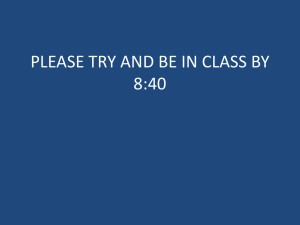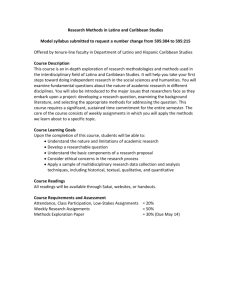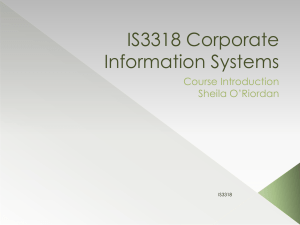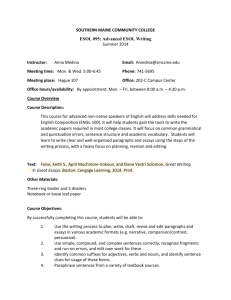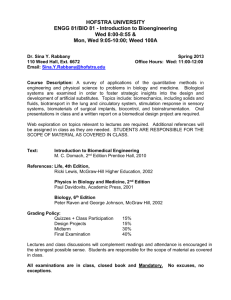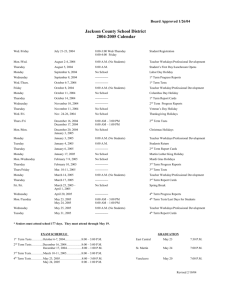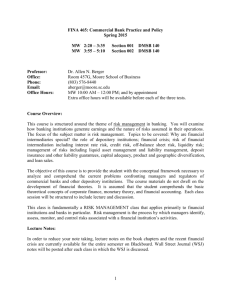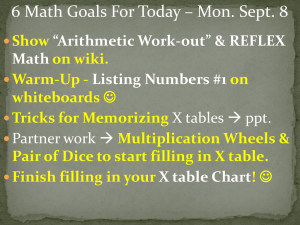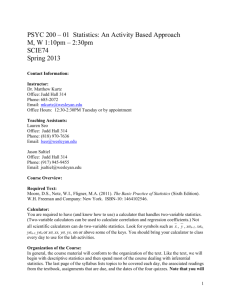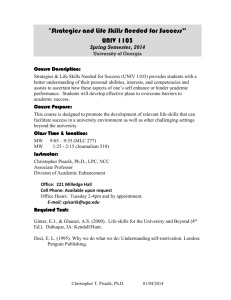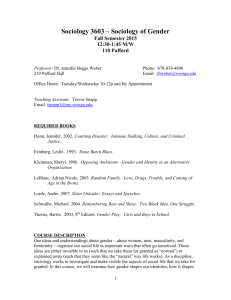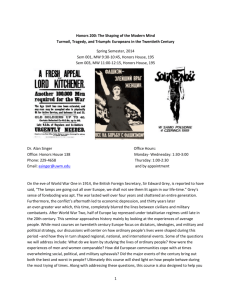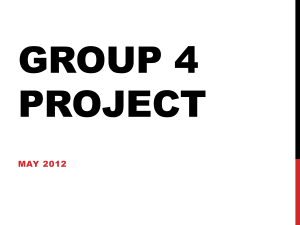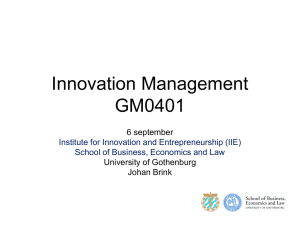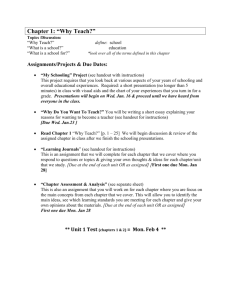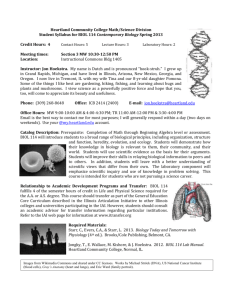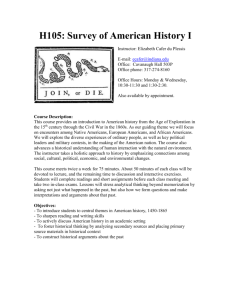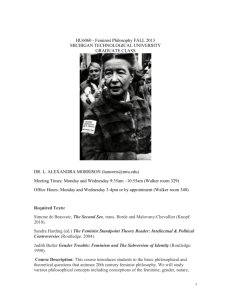Research Methods - University of Southern California
advertisement
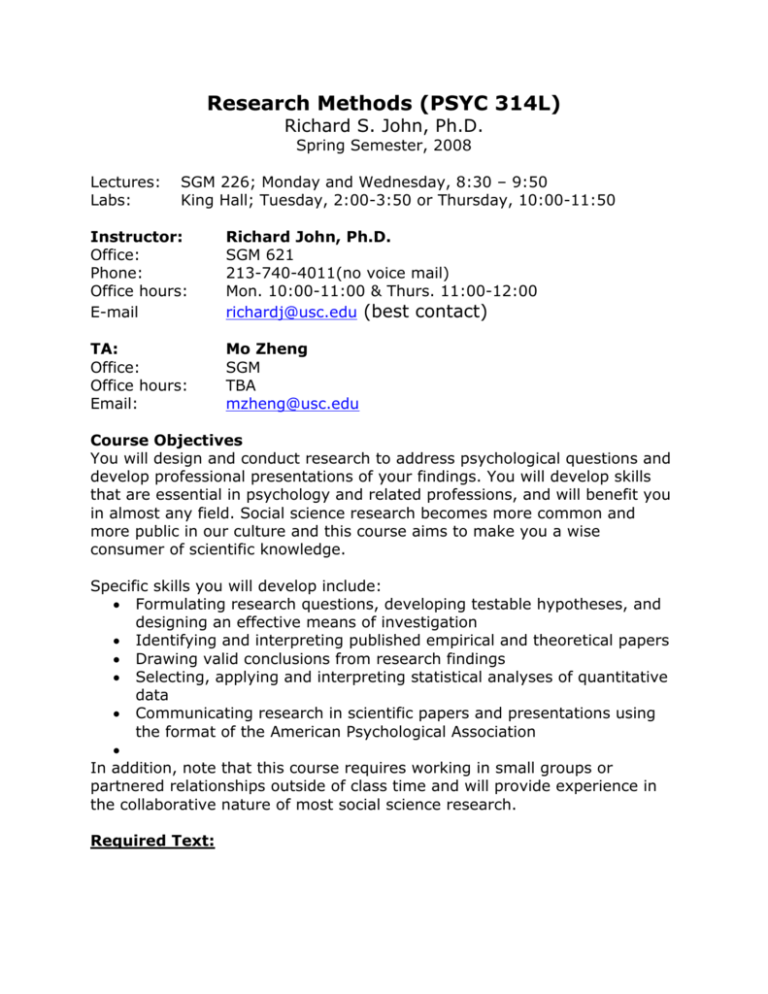
Research Methods (PSYC 314L) Richard S. John, Ph.D. Spring Semester, 2008 Lectures: Labs: SGM 226; Monday and Wednesday, 8:30 – 9:50 King Hall; Tuesday, 2:00-3:50 or Thursday, 10:00-11:50 Instructor: Office: Phone: Office hours: E-mail Richard John, Ph.D. SGM 621 213-740-4011(no voice mail) Mon. 10:00-11:00 & Thurs. 11:00-12:00 richardj@usc.edu (best contact) TA: Office: Office hours: Email: Mo Zheng SGM TBA mzheng@usc.edu Course Objectives You will design and conduct research to address psychological questions and develop professional presentations of your findings. You will develop skills that are essential in psychology and related professions, and will benefit you in almost any field. Social science research becomes more common and more public in our culture and this course aims to make you a wise consumer of scientific knowledge. Specific skills you will develop include: Formulating research questions, developing testable hypotheses, and designing an effective means of investigation Identifying and interpreting published empirical and theoretical papers Drawing valid conclusions from research findings Selecting, applying and interpreting statistical analyses of quantitative data Communicating research in scientific papers and presentations using the format of the American Psychological Association In addition, note that this course requires working in small groups or partnered relationships outside of class time and will provide experience in the collaborative nature of most social science research. Required Text: Pelham, B. W. & Blanton, H. (2007). Conducting research in psychology: Measuring the weight of smoke (3rd ed.) Belmont, California: Thomson-Wadsworth. Grading Class Participation Learning Experiences Labs Mid-term Exams Research Paper Points 100 240 200 (10 @ 20 pts each) 360 (3 @ 120 pts each) 100 Total 1000 Laboratory Activities. Graded lab activities will be assigned and due each week; there will be 3 strategically placed “byes.” These activities reinforce what is covered in class and in the text. Specific requirements for each activity will be provided in lab meetings. You should attend the lab section for which you are registered; you must request and obtain permission to attend another lab session on a week by week basis. Graded components of lab activities are due at the end of the 2 hour lab session and may not be completed or submitted outside of the scheduled meeting time. If you must miss a lab due to a prescheduled event (i.e., being out of town), you must arrange in advance of the lab period to complete the work in another of my lab sections. It is due at the end of the lab attended.. Only a limited and number of such arrangements will be made per student per semester, and requires advanced notification of all TA’s involved plus written evidence that you cannot attend your lab. If you miss lab without such arrangements, make-ups will only be allowed if you can document a lab-day emergency (see Justifiable Absences below); otherwise, a score of 0 will be assigned. Course Policies: Please read carefully!!! Attendance: Attendance in lab is required in order to receive points for the activity. Deadlines: All deadlines are firm; simply being absent the day an assignment is due, given or amended, does not grant you an extension. Written work must be printed (not emailed), and turned in during class or placed in my mailbox by the end of class on the due date. Be aware that you are responsible for information communicated in class, which is more extensive than that posted on Blackboard. I strongly recommend you attend and get notes from another student or two if you are absent. If you have a justifiable absence, you may email or come to my office hours to see if additional information was given in class. Justifiable Absences: You will be granted deadline extensions ONLY FOR THE FOLLOWING: (1) serious illness, (2) personal/family emergency, (3) school-related activity, or (4) scheduled graduate school or job interview with proof from the organization. I must have in writing from a doctor or an appropriate staff person a statement that you could not possibly attend class on specific dates which must include the lab/due date. Your extension is one class/lab period for every period you were excused. One day is assumed unless your note states otherwise. Show me your excuse the first class day after it expires and I will notify your TA that you are to make up any missed lab(s). Exams: All 3 exams are open notes (handwritten or printed; no photocopies of text). Exams will cover material in the reading assignments and in lectures. Unexcused missed exams will receive scores of 0. Make up exams will be given with written documentation as noted above and must be completed immediately after your excuse expires. You must notify me that you have an excuse within 24 hours of the exam. Using Blackboard: I post lecture slides, assignments and announcements as promptly as possible. Your TA will post or distribute lab assignments and grade and enter your lab scores. Please monitor your scores often and keep all assignments until after final grades have been determined. You will need to bring a graded assignment in as proof if it was misrecorded in Blackboard. All score corrections must be requested with proof by the scheduled final exam period. No changes will be made thereafter. Academic Integrity Cheating during an exam will result in a score of zero on that exam. No cell phones or electronic devices may be out or on during an exam. Gross dishonesty during an exam will result in a grade of F for the entire course. Plagiarism is the appropriation and subsequent distribution of another's ideas or words as one's own. If the words or ideas of another are used, acknowledgement of the original source must be made through recognized reference practices (APA style in this case). Data fabrication is creating or altering research data. Any papers judged to violate the USC academic integrity guidelines, such as evidence of plagiarism or data fabrication, will result in a grade of 0 for the work or an F for the course depending on severity, and the incident will be reported to the appropriate University Officials. All learning experiences (assignments) and quizzes will be assigned and discussed in class and posted on Blackboard. All learning experiences are due IN CLASS at 8:30 A.M. on the due date. Assignments must be submitted in a printed form. Disability Services and Programs Statement Any student requesting academic accommodations based on a disability is required to register with Disability Services and Programs (DSP) each semester. A letter of verification for approved accommodations can be obtained from DSP. Please be sure the letter is delivered to me (or to the TA) as early in the semester as possible. DSP is located in STU 301 and is open 8:30 a.m. – 5:00 p.m., Monday through Friday. The phone number for DSP is (213) 740-0776. Research Methods Psychology 314L Spring 2008 Richard S. John, Ph.D. Course Outline Wk 1 Day MON WED 2 MON WED 3 MON WED 4 MON WED 5 6 7 Chap Overview of Course: Objectives and 14-Jan Requirements Ways of knowing: Intuition, logic, authority, observation 16-Jan Science and Pseudo-science and Common Sense 1 Determinism, Empiricism, Parsimony, Falsifiability 21-Jan No Class---University Holiday 23-Jan Intuition and Introspection Nisbett and Wilson, 1977, 1978 28-Jan Probabilistic Reasoning and Inference Kahneman and Tversky, 1973, 1974 30-Jan Laws, Theories, Hypotheses Wanted: A good idea 4-Feb Measure Validity 2 3 3 MON 6-Feb Measure Reliability Measurement Scales 11-Feb Psychological Measurement WED 13-Feb Evaluating and Creating Scales 4 MON 18-Feb No Class---University Holiday WED 20-Feb Exam #1 MON WED 8 Date Topic MON Selection bias, nonresponse bias, History, 25-Feb Maturation, Regression to the Mean, Testing Effects, Attrition 27-Feb Participant Reaction bias, Experimenter bias Confounds and Artifacts 3-Mar Case studies Population surveys, Public Opinion, Epidemiology 4 1-4 5 5 6 WED 9 MON 5-Mar Correlational Research and Confounds Archival Research, Observational Research 10-Mar True Experiments Strengths of true experiments 12-Mar Experimental realism and artificiality Internal vs. External Validity 24-Mar Catch-up and Review WED 26-Mar Exam #2 MON 31-Mar Quasi-Experimental Design MON WED 10 11 WED 12 MON 15 7 5-7 8 8 MON WED 23-Apr Exam #3 MON 28-Apr Writing research papers 11 WED 30-Apr Talking about research and storytelling 11 MON WED 14 7 7-Apr One-Way and Factorial Designs Testing Interactions 9-Apr With-in Subjects Designs: Pros and Cons Mixed Model Designs: The best (and worst) of both 14-Apr Why Descriptive Statistics are important: review What Inferential Statistics really mean: review Alpha, Beta, and Power; Effect size and 16-Apr Significance Testing; Meta Analyses 21-Apr Catch-up and Review WED 13 2-Apr Evaluation Research 6 FINAL MON 12-May Final Papers due; Final Presentations EXAM 11:00 A.M. 9 9 10 10 8-10


